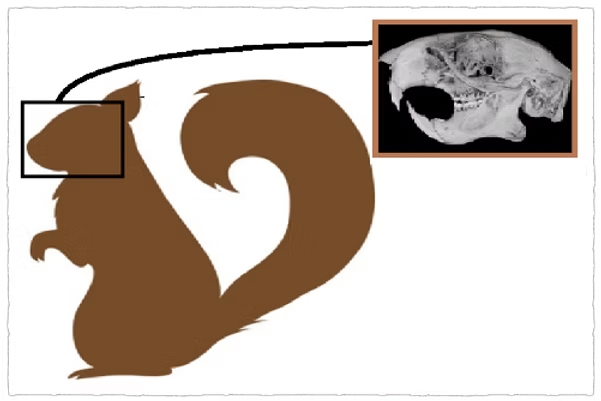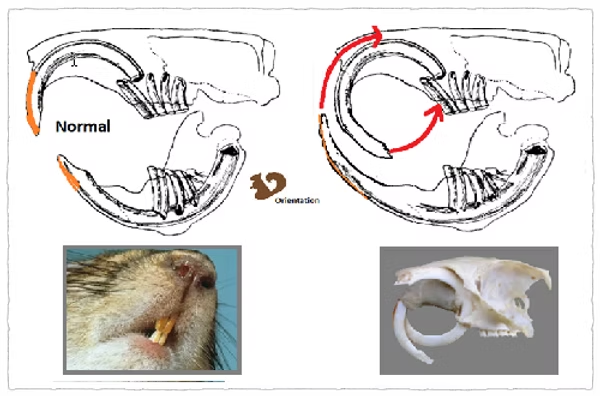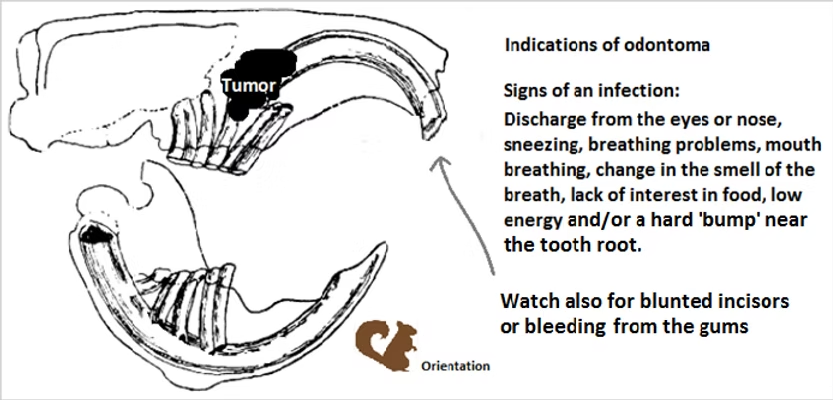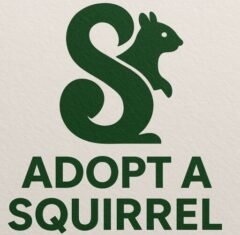Teeth Issues in Pet Squirrels
Healthy teeth are essential to your squirrel’s well-being. As a squirrel parent, understanding dental development, recognizing early warning signs of problems, and providing proper care can prevent serious issues down the road especially since squirrels have teeth that grow continuously.
Whether you’re caring for a baby squirrel or an adult, this guide covers everything you need to know about squirrel dental health, from malocclusion to odontoma.

Understanding Squirrel Teeth
Pet squirrels like wild ones have continuously growing front teeth, called incisors. These grow in a curved shape at a rate of nearly 6 inches per year and need regular wear to stay at the proper length.
- Tree squirrels typically have 20 teeth, including upper and lower incisors and 16 molars
- Eastern Gray squirrels have 22 teeth, with an extra pre-molar on each side
- Baby squirrels grow their lower incisors at 3–4 weeks and upper incisors by 5 weeks
As they chew on natural items, their teeth grind against one another, naturally maintaining sharpness and proper length.
Malocclusion (Misaligned Teeth)
Malocclusion is when a squirrel’s upper and lower teeth don’t line up correctly, leading to uneven wear or overgrowth.
Causes of Malocclusion:
- Genetic predisposition
- Facial injury or trauma
- Lack of proper chewing materials
- Past improper tooth trimming

Signs of Malocclusion:
- Overgrown or curled teeth
- Drooling or matting around the mouth
- Difficulty chewing or dropping food
- Weight loss or reduced appetite
Left untreated, misaligned teeth can puncture the mouth, jaw, or skull or cause starvation if the squirrel cannot eat.
Treatment:
Maloccluded teeth need to be trimmed every 4 weeks, often by a vet or trained caregiver. Squirrels will resist, so never attempt trimming without proper experience or supervision.
If the squirrel eats normally and the teeth are self-regulating, no trimming is needed. But always monitor closely.
📌 For long-term care, provide your squirrel with a mix of soft and hard foods, and consult your vet about proper monitoring.
Odontoma in Squirrels
Odontoma is a benign but dangerous tumor in the jaw or sinus area, often caused by:
- Facial trauma from cage bars or falls
- Aggressive or improper tooth trimming
- Genetic factors in some squirrel species
This tumor can block nasal passages, cause difficulty eating, or lead to respiratory issues.
Symptoms of Odontoma:
- Runny nose (often mistaken for a cold)
- Shortened or backward-growing upper teeth
- Visible discomfort while eating
- Weight loss or lethargy

Diagnosis:
A skull X-ray is needed to confirm odontoma. Some vets recommend baseline X-rays early in the squirrel’s life for comparison over time.
Treatment:
- Tooth removal surgery in early stages (only by an experienced exotics vet)
- Supportive care and palliative treatment in advanced cases
- If untreated, odontoma can be fatal
⚠️ Tooth removal is invasive and risky teeth are deeply rooted and curved, and swelling post-surgery can obstruct breathing. Always work with a squirrel-savvy veterinarian.
How to Prevent Dental Problems in Pet Squirrels
- Offer safe, chewable items like untreated branches, squirrel-safe wood blocks, or natural coconut shell
- Avoid wire cage chewing use solid panels, enrichment, and rotating toys to reduce boredom
- Do not clip teeth at home unless trained improper trimming can lead to trauma, fractures, or malocclusion
- Ensure a proper diet 80% rodent block and 20% fresh vegetables/fruits
- Watch for signs of discomfort drooling, appetite changes, or resistance to chewing
Supportive Dental Care for Adopted Squirrels
- Provide a soft food diet after any dental procedure
- Include rodent block for dental health, but offer variety for nutrition
- Offer acidophilus supplements or squirrel-specific probiotics after antibiotics or surgery
- Use non-toxic bedding and avoid cedar or scented materials that may irritate healing wounds
- Keep your squirrel’s stress low during recovery
Quick Reference: Dental Health Checklist
✅ Teeth checked every month
✅ Access to safe, hard chew items
✅ Vet consultation at first sign of overgrowth or infection
✅ Diet balanced for calcium and phosphorus
✅ Minimal cage bar chewing
✅ Familiarity with early signs of odontoma and malocclusion
Final Word for Adoptive Squirrel Parents
Caring for your squirrel’s dental health is a long-term commitment but it’s entirely manageable with the right tools and attention. If you ever suspect something’s wrong, don’t wait early detection and care can save your squirrel’s life and comfort.
